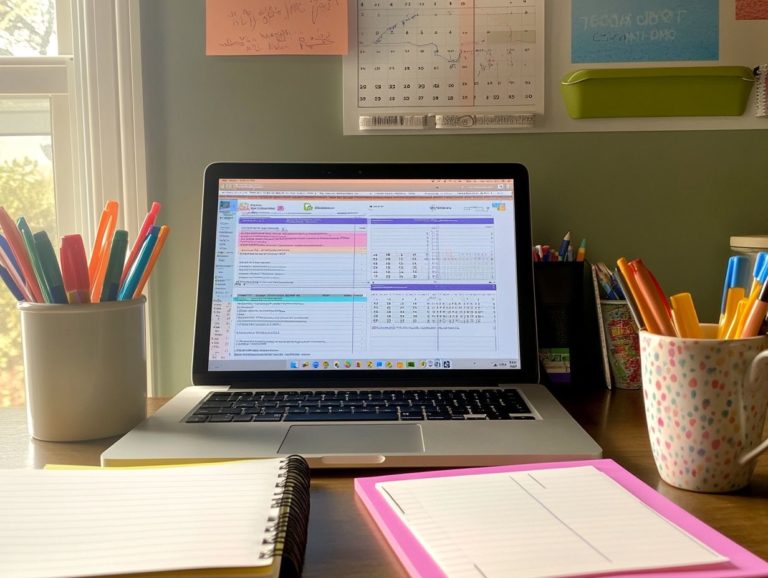how to balance practice tests with study time
Preparing for exams can feel overwhelming. However, integrating practice tests into your study routine can truly transform your approach.
This article delves into the vital role that practice tests play in effective exam preparation and provides valuable insights on crafting a balanced study schedule.
You will uncover effective study techniques, learn how to get the most out of your practice tests today, and explore strategies for tracking your progress.
We will also address test anxiety and provide methods to manage it effectively.
Discover how to optimize your study time and elevate your confidence to new heights!
Contents
- Key Takeaways:
- The Importance of Practice Tests
- Creating a Study Schedule
- Effective Study Techniques
- Incorporating Practice Tests into Your Study Plan
- Monitoring Progress and Adjusting Study Schedule
- Dealing with Test Anxiety
- Final Thoughts on Balancing Practice Tests and Study Time
- Frequently Asked Questions
- 1. How often should I take practice tests while studying?
- 2. How much time should I dedicate to taking practice tests?
- 3. Should I prioritize practice tests over studying?
- 4. Can I use practice tests as my only study method?
- 5. How do I know if I am spending enough time on practice tests?
- 6. Is it better to take practice tests in the morning or at night?
Key Takeaways:

Practice tests are crucial for effective exam preparation as they allow for self-assessment and identification of weak areas. Balancing practice tests and study time can be achieved by creating a study schedule that incorporates both at regular intervals. Additionally, learning how to balance study techniques and leisure can enhance your overall productivity. Maximizing study time can be done by utilizing effective techniques like breaking down material, using flashcards, and practicing past exam questions.
The Importance of Practice Tests
Practice tests are essential for elevating your educational outcomes. By leveraging principles from psychology, particularly the idea that testing helps you remember better, you will find that regular retrieval practice significantly enhances your long-term retention of knowledge.
Educators understand that including practice tests in your study plan not only deepens your grasp of concepts but also cultivates effective learning habits, whether you re in school, high school, or college.
Why Practice Tests are Crucial for Exam Preparation
Practice tests are essential for your exam preparation. They provide you with the opportunity to engage with questions that closely resemble actual test conditions. This boosts your confidence and can lead to better exam scores!
As you work through these tests, you’ll easily pinpoint any knowledge gaps that require further attention. This enables you to customize your study strategies for maximum effectiveness. For instance, navigating through multiple-choice questions allows you to quickly identify which topics challenge you the most, prompting you to concentrate your efforts there.
Formative assessments deliver immediate feedback, helping you grasp not only which answers are correct but also why others may fall short. This comprehensive understanding serves as a guide for your future revisions, making practice tests an invaluable asset on your path to academic success.
Creating a Study Schedule
Establishing a structured study schedule is essential for effectively managing your study time.
This approach allows you to seamlessly balance practice sessions with content review, ultimately optimizing your learning outcomes and enhancing retention techniques.
Balancing Practice Tests and Study Time
Balancing practice tests with your study time is essential for maximizing your cognitive energy and ensuring thorough test preparation. For tips on how to balance test prep with other commitments, focus on honing effective study techniques.
To achieve this balance, integrating a variety of practice formats can work wonders. For example, alternating between multiple-choice tests, short-answer questions, and flashcards keeps your study sessions dynamic and engaging. Additionally, learning how to create a balanced practice schedule can enhance your study efficiency. This method not only combats monotony but also accommodates different learning styles.
Setting specific time blocks for each type of practice test can significantly enhance your focus and efficiency. For more strategies, consider exploring how to stay focused during practice tests. Don’t underestimate the power of short breaks; these intervals help alleviate test anxiety and promote better information retention.
By tracking your progress, you can make smart choices about how to allocate your time wisely and adjust your efforts toward areas where you may be struggling, ensuring a comprehensive preparation strategy.
Effective Study Techniques

Utilizing effective study techniques, such as active recall and various retention strategies, is essential for enhancing your memory retrieval.
These methods ensure that you grasp and retain information long after your study sessions have concluded. Embracing these approaches can significantly elevate your learning experience and solidify your understanding of the material.
Start integrating practice tests into your study schedules right away!
Tips for Maximizing Study Time
Maximize your study time by using effective techniques that focus on practical thinking methods and engaging learning opportunities.
Set specific and achievable goals to sharpen your focus. This will help you track your progress methodically.
Use practice tests to get instant feedback. These assessments help you identify gaps in your knowledge, making your study sessions more targeted.
Make studying interactive by using quizzes. This boosts your motivation and helps you remember more.
Regularly review what you ve learned. This reinforces key concepts and helps you retain information over time.
Seek feedback from friends or teachers for valuable insights. This keeps your study sessions dynamic and effective.
Incorporating Practice Tests into Your Study Plan
Incorporating practice tests into your study plan is a great strategy for enhancing retrieval practice. This approach allows you to assess your understanding and refine your retention techniques through consistent testing, ultimately leading to improved mastery of the material.
How to Use Practice Tests Effectively
To use practice tests effectively, focus on understanding the feedback they provide. For more insights, explore how to effectively review practice test results. Apply memory retrieval techniques to enhance your learning experience. Recognize that timed practice tests mimic actual exam conditions.
Stick to strict time limits to create a sense of urgency while identifying areas where you might be struggling. Post-test analysis is key in this process; take time to thoroughly review not just the correct answers but also your mistakes.
This reflective practice helps you spot patterns or knowledge gaps that may need extra attention. Adjust your study habits based on these insights to improve your performance.
Manage test anxiety through mindfulness practices or positive visualization to boost your confidence and focus. This leads to a more rewarding study experience.
Monitoring Progress and Adjusting Study Schedule
Keep your study game strong by monitoring progress and tweaking your schedule as needed! This ensures you effectively track your improvement and adapt your study strategies to achieve your learning outcomes.
Tracking Improvement and Making Necessary Changes

Tracking your improvement is crucial for making necessary adjustments to your study habits and ensuring that your academic performance aligns with your learning goals.
Create a personalized learning experience by using self-assessment techniques like reflective journaling or regular quizzes. These methods provide valuable insights into your understanding and retention of the material.
Feedback from practice sessions is a powerful indicator of your progress, offering constructive criticism you can use in future study sessions.
As you analyze your results, you’ll see the importance of adapting your study strategies. Whether it means changing your learning styles, dedicating more time to challenging subjects, or setting quarterly benchmarks, these adjustments are vital for your continued growth and deeper comprehension.
Dealing with Test Anxiety
Addressing test anxiety is essential for enhancing your performance. By implementing effective strategies, you can significantly reduce stress and boost your cognitive abilities during exams.
Strategies for Managing Test Anxiety
Effective strategies for managing test anxiety involve stress relief techniques and study methods that boost your confidence. Using these methods can lessen your apprehension and improve your exam performance.
Thorough preparation is essential. When you engage in structured study techniques like creating study guides and practicing past test questions, you foster a sense of readiness that is enabling.
Utilizing positive self-talk is a powerful motivator. It transforms negative thoughts into affirmations that uplift your self-esteem. Mindfulness practices like deep breathing and meditation promote relaxation, allowing you to stay calm and focused on the task at hand.
Collectively, these strategies create an environment where anxiety is managed constructively instead of becoming overwhelming.
Final Thoughts on Balancing Practice Tests and Study Time
Balancing practice tests with study time is crucial for maximizing your academic performance and achieving effective learning outcomes. For insights on how to balance school and test preparation, this method reinforces content retention and sharpens your critical thinking skills, important tools for understanding difficult topics.
By incorporating regular practice tests into your study routine, you can pinpoint knowledge gaps and adjust your focus, making your study sessions more productive.
These assessments mimic exam conditions, helping you reduce anxiety and enhance your time management skills when it counts. Embracing these strategies significantly impacts your overall success and helps cultivate lifelong study habits.
Frequently Asked Questions
1. How often should I take practice tests while studying?

It is recommended to take practice tests at least once a week while studying, but the frequency can vary based on your study schedule and goals.
2. How much time should I dedicate to taking practice tests?
Balance the amount of time you spend on practice tests with your study time. It is recommended to allocate 30-60 minutes for each practice test, as highlighted in the importance of practice tests in study techniques.
3. Should I prioritize practice tests over studying?
No, maintaining a balance between taking practice tests and studying is essential. Learning how to balance test prep with extracurriculars is crucial for exam success.
4. Can I use practice tests as my only study method?
No, while practice tests can be helpful, it s important not to rely solely on them. Don t skip reviewing material!
5. How do I know if I am spending enough time on practice tests?
Track your progress and adjust as needed. Improvement in your scores and confidence in your knowledge indicate you are likely spending enough time on practice tests. To maximize your results, learn how to set goals for your practice tests.
6. Is it better to take practice tests in the morning or at night?
This can vary based on personal preference and schedule. However, taking practice tests in the morning can mimic actual exam timing and help you identify areas needing more focus during study sessions.






